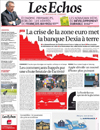"Dexia initiative gathers speed," headlines De Standaard. The Flemish daily explains that on 4 October, representatives of Paris and Brussels held an emergency meeting to discuss a rescue plan for the Franco-Belgian bank, which is in difficulty for the second time in three years. The two countries have agreed to divide the bank in two, thereby creating a "bad bank" which will retain toxic assets (Greek and Italian loans and American mortgages). The Editor of De Standaard, Bart Sturtewagen, wonders why “the three years that have gone by were not sufficient to enable us to avoid yet another pressing banking crisis:”

We knew that Dexia was a zombie bank, which was faced with deep structural challenges. An unbalanced Franco-Belgian marriage that was too vulnerable to the vicissitudes of the interbank market to be safe. A bank whose healthier businesses […] would never have encountered any problems if the rules of the game had been respected. […] Dexia is only the tip of the iceberg. Since the start of the banking crisis, all we have done is to reassign financial institutions’ debts to governments. To avoid a systemic crisis, we tried to spare banks and their shareholders, in the hope that a massive influx of cheap money would give banks sufficent time to reinforce their capital structure. [...] We have come as far as we can with this, and the next part of the story is going to be written in blood red ink. – De Standaard
 How did it come to this? Having borrowed on cheap short-term markets to offer more expensive long-term finance in the form of toxic financial products, Dexia embarked on "a frenzy of acquisitions, buying up business and even portfolios of businesses. In Spain, Italy, Japan and the United States… it bought wherever it could," points out Le Figaro. in so doing, Dexia created “a monstrous speculative position on lending rates.” In October 2008, Dexia, like "a hormone doped bullock, was taken by surprise," writes the daily. And the Eurozone crisis has finally caused the collapse of what was an extremely fragile edifice, but fortunately a “very rare” one.
How did it come to this? Having borrowed on cheap short-term markets to offer more expensive long-term finance in the form of toxic financial products, Dexia embarked on "a frenzy of acquisitions, buying up business and even portfolios of businesses. In Spain, Italy, Japan and the United States… it bought wherever it could," points out Le Figaro. in so doing, Dexia created “a monstrous speculative position on lending rates.” In October 2008, Dexia, like "a hormone doped bullock, was taken by surprise," writes the daily. And the Eurozone crisis has finally caused the collapse of what was an extremely fragile edifice, but fortunately a “very rare” one.

– Le Figaro
For Les Echos, the restructuring of Dexia will have a major impact on the credibility of the member states concerned:

No matter how grave its past sins, the Dexia scandal could have been resolved three years ago. For that, the French and Belgian states would have had to take the knife out in 2008. But they preferred to give more and more time, and they were not alone in this approach. Several European states adopted a similar strategy. Three years down the line, most of these institutions (in countries like Spain, Germany, and Italy...) have yet to recover. They survive like zombies feeding on credit from the ECB, and undermine confidence in the entire European banking sector. . […] And the problem is that in the meantime, the financial crisis has become a sovereign debt crisis. Today we are not simply faced with need to restructure the banking sector, because the market credibility of sovereign states is now at stake. – Le Figaro
"Dexia shows what's in store for European banks," writes Cinco Días. For the Spanish business daily:

Far from being an isolated case, Dexia has become the first visible victim of the serious structural damage to European financial institutions caused by the sovereign debt crisis. The fact that it passed last summer’s stress tests without incident is not only proof of the unreliability of the tests, but also — and more importantly — of the major changes that have emerged in the “photo portrait” of the banking system since then. This is not really surprising, if you consider that the tests never took into account the possibility of default [by a sovereign state], not even Greek default. […] The road taken by Dexia is one that it should not walk alone. This is the first step in a process of bailing out, cleaning up and restructuring of the financial system that can no longer be postponed. – Le Figaro
Was this article useful? If so we are delighted!
It is freely available because we believe that the right to free and independent information is essential for democracy. But this right is not guaranteed forever, and independence comes at a cost. We need your support in order to continue publishing independent, multilingual news for all Europeans.
Discover our subscription offers and their exclusive benefits and become a member of our community now!












